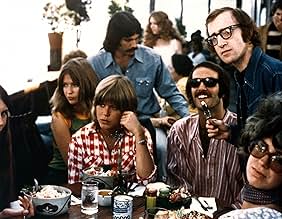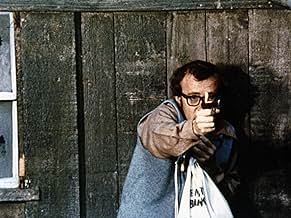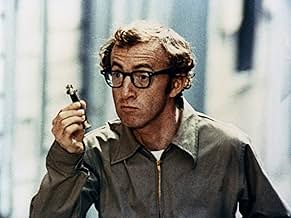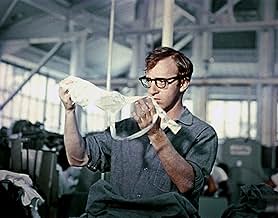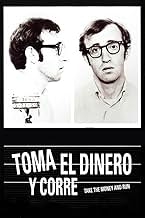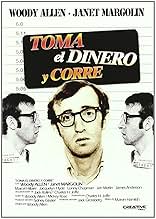NOTE IMDb
7,2/10
32 k
MA NOTE
La vie et l'histoire de Virgil Starkwell, braqueur de banque incapable.La vie et l'histoire de Virgil Starkwell, braqueur de banque incapable.La vie et l'histoire de Virgil Starkwell, braqueur de banque incapable.
- Réalisation
- Scénario
- Casting principal
- Récompenses
- 3 nominations au total
Dan Frazer
- Julius Epstein - The Psychiatrist
- (as Don Frazier)
Jackson Beck
- The Narrator
- (voix)
Avis à la une
The clumsy Virgil Starkwell (Woody Allen) is bullied when he is a child. Then he decides to play cello, but without musical talent, the loser joins a street gang and ends in prison. When he escapes, he meets the laundry worker Louise (Janet Margolin) and lies to her, telling that he plays cello in the symphonic orchestra.
He is arrested in a hold up and Louise finds him in prison. He breaks out and flees with Louise to another state. He tries to be honest but he is incapable to fit in any job. When he finally finds a job position suitable for his intellect, he is blackmailed by a colleague and returns to his criminal life. But his heists are disastrous and he always ends in prison.
"Take the Money and Run" is the second film by Woody Allen in a documentary style the same way he does with "Zelig" in 1983, and tells the saga of a clumsy smalltime thief. The last time I had seen this film was on 22 August 1999 and this time I found it still enjoyable, but less than the last time.
Virgil Starkwell is an incompetent loser obsessed with bank heists. The narrative and interviews in the documentary style of the 60's and 70's have hilarious moments and is closed by the funny interview of his neighbor that asks to the interviewer how an imbecile like Virgil could plan the heist of banks. My vote is seven.
Title (Brazil): "Um Assaltante Bem Trapalhão" ("A Very Clumsy Thief")
He is arrested in a hold up and Louise finds him in prison. He breaks out and flees with Louise to another state. He tries to be honest but he is incapable to fit in any job. When he finally finds a job position suitable for his intellect, he is blackmailed by a colleague and returns to his criminal life. But his heists are disastrous and he always ends in prison.
"Take the Money and Run" is the second film by Woody Allen in a documentary style the same way he does with "Zelig" in 1983, and tells the saga of a clumsy smalltime thief. The last time I had seen this film was on 22 August 1999 and this time I found it still enjoyable, but less than the last time.
Virgil Starkwell is an incompetent loser obsessed with bank heists. The narrative and interviews in the documentary style of the 60's and 70's have hilarious moments and is closed by the funny interview of his neighbor that asks to the interviewer how an imbecile like Virgil could plan the heist of banks. My vote is seven.
Title (Brazil): "Um Assaltante Bem Trapalhão" ("A Very Clumsy Thief")
Woody Allen hit gold with his second film, "Take the Money and Run", which is a basic film that works on so many levels and is memorable strictly for its charm and good wit.
The story follows Allen's Virgil Starkwell, whose life is told in documentary fashion. We learn he had a strange childhood and turned to crime to fulfill his needs. We learn of his romance and sympathize with him as we engage in prison escapes and witness him put in a chain gang. The documentary style might prove to be a "gimmick" of sorts, but it works because had the story been told any other way it simply would not have worked.
Also, "Take the Money" is an early token of what's to come and what the general audience will expect of Allen; smooth drama balanced by fast, witty monologues and lots of self-humiliation. To see this is to witness the early work of the director who ultimately brought us "Bananas", "Sleeper", "Manhattan", and the Oscar-winning "Annie Hall". And if anything, just track it for its over-the-top humor, not as in-your-face funny as "Sleeper" or as sexually hilarious as "Annie Hall", but it's warm and withdrawn, balanced all together by a very good ending (always one of the weaker parts in almost all of Allen's films).
Highly recommended! ***+ (8.5/10)
The story follows Allen's Virgil Starkwell, whose life is told in documentary fashion. We learn he had a strange childhood and turned to crime to fulfill his needs. We learn of his romance and sympathize with him as we engage in prison escapes and witness him put in a chain gang. The documentary style might prove to be a "gimmick" of sorts, but it works because had the story been told any other way it simply would not have worked.
Also, "Take the Money" is an early token of what's to come and what the general audience will expect of Allen; smooth drama balanced by fast, witty monologues and lots of self-humiliation. To see this is to witness the early work of the director who ultimately brought us "Bananas", "Sleeper", "Manhattan", and the Oscar-winning "Annie Hall". And if anything, just track it for its over-the-top humor, not as in-your-face funny as "Sleeper" or as sexually hilarious as "Annie Hall", but it's warm and withdrawn, balanced all together by a very good ending (always one of the weaker parts in almost all of Allen's films).
Highly recommended! ***+ (8.5/10)
Now I'm rarely a man to agree with any 'consensus view' of particular films, yet I very much have to go along with the tide as regards 'Take the Money and Run' - only the second Allen film I have commented upon here, though I have seen many more.
Basically, the film is enjoyable viewing throughout, but not an entirely consistent, successful comedy. Allen had yet to hone his skills in fashioning feature length films; I have reservations more so for 'Bananas', less so for 'Sleeper' and 'Love and Death'; the two films with which he really hits his stride. This is his first film as a director and thus maybe it is to be expected that we'll see a transitional film. One can tell Allen is trying to work out a formula to translate his largely verbal stand-up humour to film. He really does a pretty good job of this. There are plenty of very good jokes and a generally very lightweight, genial tone to this picture. It is seen through by this, yet is hamstrung by its very effervescence; the film is likeable and won me over, yet it is too scattershot in approach and delivery to really satisfy.
Woody himself is an instantly winning figure in his comic persona; that of a physically diminutive and verbally bumbling Jewish intellectual. With in this film the vocation of a bank robber; a displacement which results in much of the expected amusement. There's not yet any attempt to go very deep into this character of his, but this is a pure, light comedy. No real New York or indeed Bergman or Chekhov reference points yet.
One is reminded in Allen of David Thomson's insightful comments on Chaplin and the persona he projected to audiences; trying to charm them and win them over by a certain vulnerability and status as 'underdog'. It is very true that in many of Allen's films, like Chaplin, he is right at the centre of the film, and the world outside is not portrayed with any sense of the mechanics of reality. Conflicts are never all that serious or convincing; he draws from a limited pool of character types, in socio-political terms. Allen has done films with other leads; though his usual concerns always find their way through. 'Take the Money and Run' is full of the Chaplin tendency to have bullish, physically imposing figures, or indeed perhaps a wider society, threatening the 'little man'. There is a wish-fulfilment woman in the languid person of Janet Margolin's Louise; as a character more a projection than of flesh and blood or shades of grey. She works well as a slightly wan, attractive comic foil for Allen, who doesn't mind getting her hands dirty, but she's really not Diane Keaton.
This film is slight, no question about that... it fails under real scrutiny, yet it is largely very enticing stuff; an early glimpse of Allen getting his filmic technique in order. If you like what the man does - and surely most (wryly bespectacled) film cineastes such as I do! - then you are sure to enjoy this film. Just don't count on it being a triumph in the major key.
Rating:- *** 1/2/*****
Basically, the film is enjoyable viewing throughout, but not an entirely consistent, successful comedy. Allen had yet to hone his skills in fashioning feature length films; I have reservations more so for 'Bananas', less so for 'Sleeper' and 'Love and Death'; the two films with which he really hits his stride. This is his first film as a director and thus maybe it is to be expected that we'll see a transitional film. One can tell Allen is trying to work out a formula to translate his largely verbal stand-up humour to film. He really does a pretty good job of this. There are plenty of very good jokes and a generally very lightweight, genial tone to this picture. It is seen through by this, yet is hamstrung by its very effervescence; the film is likeable and won me over, yet it is too scattershot in approach and delivery to really satisfy.
Woody himself is an instantly winning figure in his comic persona; that of a physically diminutive and verbally bumbling Jewish intellectual. With in this film the vocation of a bank robber; a displacement which results in much of the expected amusement. There's not yet any attempt to go very deep into this character of his, but this is a pure, light comedy. No real New York or indeed Bergman or Chekhov reference points yet.
One is reminded in Allen of David Thomson's insightful comments on Chaplin and the persona he projected to audiences; trying to charm them and win them over by a certain vulnerability and status as 'underdog'. It is very true that in many of Allen's films, like Chaplin, he is right at the centre of the film, and the world outside is not portrayed with any sense of the mechanics of reality. Conflicts are never all that serious or convincing; he draws from a limited pool of character types, in socio-political terms. Allen has done films with other leads; though his usual concerns always find their way through. 'Take the Money and Run' is full of the Chaplin tendency to have bullish, physically imposing figures, or indeed perhaps a wider society, threatening the 'little man'. There is a wish-fulfilment woman in the languid person of Janet Margolin's Louise; as a character more a projection than of flesh and blood or shades of grey. She works well as a slightly wan, attractive comic foil for Allen, who doesn't mind getting her hands dirty, but she's really not Diane Keaton.
This film is slight, no question about that... it fails under real scrutiny, yet it is largely very enticing stuff; an early glimpse of Allen getting his filmic technique in order. If you like what the man does - and surely most (wryly bespectacled) film cineastes such as I do! - then you are sure to enjoy this film. Just don't count on it being a triumph in the major key.
Rating:- *** 1/2/*****
TAKE THE MONEY AND RUN is Mel Brooks-like in structure and gags, but definitely Woody Allen at his comical best. Its not his greatest picture by any means, but perhaps the best of his early slapstick flicks (SLEEPER, BANANAS). "Virgil Starkwell" has a hard time stealing right from the start. When a criminal gets a gumball machine "stuck to his hand", you know he's in the wrong gig. Woody Allen is right at home with this innocent, documentary-style drip on the unintentional hilarity of 60's crime documentaries. Woody, or "Virgil", seems to be playing Woody as usual, something we all know runs through his entire body of work. This movie is very much like his innovative ZELIG of 1983, a black and white docu-spoof about a fictional chameleon.
Jackson Beck's narration is PERFECT in making the outrageous material seem "serious". It no doubt inspired the short spoofs "Saturday Night Live" would go on to produce for years, investigative reporting seemingly important, yet ridiculous in content. "Virgil's" parents are in disguise (Groucho Marx nose and glasses) whenever they are "interviewed". The chain gang escape is one of the funniest sequences I have ever seen. Woody also moves into romantic territory with the beautiful Janet Margolin, who had a nice, fat purse for "Virgil" to steal, but also has a quick reaction to his inept robbery attempt and, of course, they fall in love. She is there for "Virgil" to live for during his always brief prison stays and to pick out his clothes for a robbery. There are some familiar elements here, most obviously the beautiful young girl falling for a middle-aged homely Woody.
TAKE THE MONEY AND RUN is all about raw comedic filmmaking and mockery. It is not a situational film at all, just a bunch of perfectly cohesive episodes of this perfectly moronic bank robber, who spells gun G-U-B. Wouldn't that throw us all off if we were the bank tellers taking a note during a stick up ?
Jackson Beck's narration is PERFECT in making the outrageous material seem "serious". It no doubt inspired the short spoofs "Saturday Night Live" would go on to produce for years, investigative reporting seemingly important, yet ridiculous in content. "Virgil's" parents are in disguise (Groucho Marx nose and glasses) whenever they are "interviewed". The chain gang escape is one of the funniest sequences I have ever seen. Woody also moves into romantic territory with the beautiful Janet Margolin, who had a nice, fat purse for "Virgil" to steal, but also has a quick reaction to his inept robbery attempt and, of course, they fall in love. She is there for "Virgil" to live for during his always brief prison stays and to pick out his clothes for a robbery. There are some familiar elements here, most obviously the beautiful young girl falling for a middle-aged homely Woody.
TAKE THE MONEY AND RUN is all about raw comedic filmmaking and mockery. It is not a situational film at all, just a bunch of perfectly cohesive episodes of this perfectly moronic bank robber, who spells gun G-U-B. Wouldn't that throw us all off if we were the bank tellers taking a note during a stick up ?
For those of you who think that all Woody Allen's movies are vapid stories of neurotic rich New Yorkers, you need to see his early movies. "Take the Money and Run" is a good example. Allen plays Virgil Starkwell, an inept criminal. No matter what sort of crime he tries to pull off, something always goes wrong. Probably the funniest scene is when he tries to escape from jail like John Dillinger did. Other scenes include the time when the authorities use him in an experiment, with a silly result.
Anyway, Woody Allen's old movies were really funny. The thing was that he created a bunch of outlandish premises and infused his New York Jewish humor. This is what comedy is all about!
Anyway, Woody Allen's old movies were really funny. The thing was that he created a bunch of outlandish premises and infused his New York Jewish humor. This is what comedy is all about!
Le saviez-vous
- AnecdotesThe first widely-released "mockumentary."
- GaffesAs the chain gang escapes, they climb the same embankment twice.
- ConnexionsFeatured in The Dick Cavett Show: Woody Allen (1971)
Meilleurs choix
Connectez-vous pour évaluer et suivre la liste de favoris afin de recevoir des recommandations personnalisées
- How long is Take the Money and Run?Alimenté par Alexa
Détails
- Date de sortie
- Pays d’origine
- Langues
- Aussi connu sous le nom de
- Take the Money and Run
- Lieux de tournage
- Sociétés de production
- Voir plus de crédits d'entreprise sur IMDbPro
Box-office
- Budget
- 1 500 000 $US (estimé)
- Durée1 heure 25 minutes
- Mixage
- Rapport de forme
- 1.85 : 1
Contribuer à cette page
Suggérer une modification ou ajouter du contenu manquant

Lacune principale
By what name was Prends l'oseille et tire-toi! (1969) officially released in India in English?
Répondre


